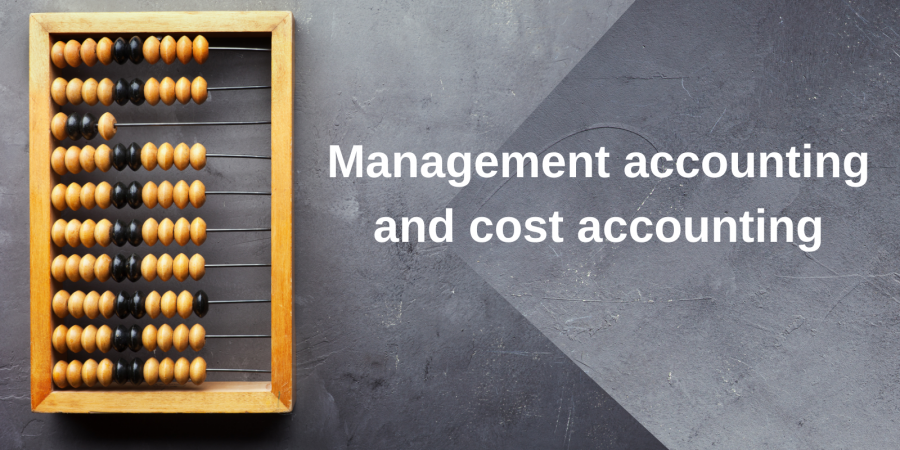Management Accounting and Cost Accounting
The act of tracking, documenting, reporting, and evaluating all expenses connected with creating a product or providing a service is known as cost accounting.
Cost accounting considers direct, indirect, constant, and variable expenses, as well as the costs involved with each phase of your company’s operations. Cost accounting tries to analyze, control, and minimize expenses by using actual, historical financial data.
Management Accounting:-
Management accounting examines all aspects of a company’s finances and operations, including expenses, to provide not just a quantitative but also a qualitative analysis to aid in better decision making and improved business strategy based on both historical data and expected statistics.

Application and Usage:-
The terms cost accounting and management accounting are used interchangeably.
THE MOST IMPORTANT DIFFERENCE BETWEEN THE TWO METHODS:-
- Cost accounting assists firms in lowering expenses, preventing budget overruns, and increasing efficiency.
- Management accounting gives a more comprehensive financial picture, historical data, and future financial projects to help drive decision-making and reinforce corporate strategy.
Interdependence and Scope:-
- Cost accounting is only concerned with costs.
- Management accounting examines all aspects of a company’s operations, including cost.
- Since management accounting incorporates all areas of a company’s finances, cost accounting is a subset of management accounting.
As a result, precise cost accounting is critical to successful management accounting. Your company’s management accounting methods, on the other hand, have no bearing on the performance of your cost accounting processes.
Reporting:-
Cost accounting use cost reports to capture and report overall operational expenses. This differs from management accounting reports, which include cash flow forecasts and profit and loss statements by class.
Despite differences, cost accounting reports are required for management accounting in order to create profit and loss statements by class, identify business drivers, and assist data-driven decision-making.
There are five different types of cost accounting:-
1. Accounting for Standard Costs:-
Instead of the real expenses, standard cost accounting allocates figures that are considered typical to a company’s cost of goods sold (COGS).
Standard costs (also known as efficient costs) are those that exist under typical operating conditions with efficient utilization of labor, time, and material expenses. In other words, typical expenses are similar to a budget that may be utilized to demonstrate your expected COGS.
When conventional expenses are compared to real costs, you will notice a difference. If real costs exceed standard costs, you have an adverse variance.
If they are lower, the variance is advantageous. Analyzing variance may be beneficial in improving efficiency, budgets, and revenues.
2. Activity-Based Cost Accounting
Activity-based cost accounting is quite beneficial since it allows you to generate profit and loss statements per unit at the management accounting level. This allows you to view your real expenses, earnings, and profit margins for almost any part of your organization.
You may use ABC accounting to determine which clients, service kinds, occupations, projects, people, or departments are actual profit generators in your company and which are costing you more than you know.
3. Streamlined Accounting
Lean accounting examines expenses with the purpose of reducing waste and increasing efficiency in order to support the most efficient corporate operation feasible.
The goal of lean accounting is to enhance overall financial management in order to increase ROI and profit margins.
4. Accounting for Marginal Costs
Marginal cost accounting (also known as cost-volume-profit analysis) examines your break-even point and contribution margins to evaluate how much a given service or product adds to the total profitability of your organization.
This sort of cost may be used to quantify the influence that volume and varied expenses have on your profitability, in addition to assisting in pricing optimization and marketing evaluation.
5. Accounting for Environmental Costs
This sort of cost accounting keeps track of expenditures connected to the environmental impact of delivering a service or manufacturing a product. Not every type of organization has to consider environmental impact costs, but it may be extremely beneficial in areas where these costs might be large, such as construction.
Waste management, dealing with polluted job sites, preventing and decreasing pollution, introducing pollution control technology, and the expenses of cleaning up are all examples of environmental costs linked with operations.
Environmental costing evaluates such charges in relation to the overall cost of production and their impact on a company’s profit margins.
If you work in a sector where the public is focused on your company and its environmental effect, you may utilize these figures to improve your public image through public relations that highlight your efforts to minimize your carbon footprint. Putting in Place a Cost Accounting System to Aid in Successful Management Accounting
At first appearance, the foundations of cost accounting appear straightforward. You’re probably already tracking and documenting costs in order to generate a balance sheet and income statement for your financial accounting duties. Automation saves time and money while also boosting your company’s back-office operations. You’ll get more dynamic, accurate, and easily accessible management reports with technology intended to automate cost monitoring and time tracking.
You may develop an effective and accurate cost accounting system designed to support successful management accounting for a stronger business strategy and a better future with the correct technology and back-office operations.
Outsource with Mindspace for the Expert and trusted Bookkeeping services in London, call us today!


